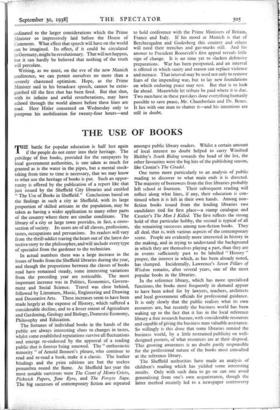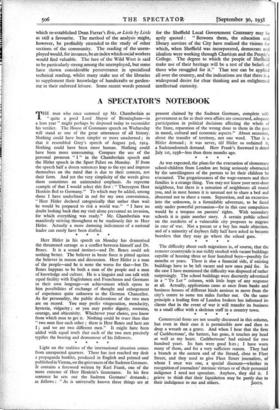THE USE OF BOOKS
THE battle for popular education is half lost again if the people do not enter into their heritage. The privilege of free books, provided for the ratepayers by local government authorities, is one taken as much for granted as is the water in the pipes, but a mental stock- taking from time to time is necessary, that we may know to what use the heritage of books is put. Such an oppor- tunity is offered by the publication of a report like that just issued by the Sheffield City libraries and entitled " The Use of Books in Sheffield." Conclusions based on the findings in such a city as Sheffield, with its large proportion of skilled artisans in the population, may be taken as having a wider application to many other parts of the country where there are similar conditions. The library of a city or large town provides, in fact, a cross- section of society. Its users are of all classes, professions, tastes, occupations and persuasions. Its readers will vary from the thrill-addict tearing the heart out of the latest de- tective story to the philosopher, and will include every type of specialist from the gardener to the technician.
In actual numbers there was a large increase in the issues of books from the Sheffield libraries during the year, and though the proportions between the classes of books read have remained steady, some interesting variations from the preceding year are noticeable. The most important increase was in Politics, Economics, Govern- ment and Social Science. Travel was close behind, followed by Literature, Music, Engineering and Drawing and Decorative Arts. These increases seem to have been made largely at the expense of History, which suffered a considerable decline, and to a lesser extent of Agriculture and Gardening, Geology and Biology, Domestic Economy, Philosophy and Education.
The fortunes of individual books in the hands of the public are always interesting clues to changes in tastes, whilst some established reputations survive all fluctuations and emerge re-endorsed by the approval of a reading public that is forever being renewed. The " enthusiastic minority " of Arnold Bennett's phrase, who continue to read and re-read a book, make it a classic. The leather bindings and the prize editions are but the useless penumbra round the flame At Sheffield last year the most notable survivors were The Count of Monte Cristo, Pickwick Papers, Jane Eyre, and The Forsyte Saga. The big successes of contemporary fiction are repeated amongst public library readers. Whilst a certain amount of local interest no doubt helped to carry Winifred Holtby's South Riding towards the head of the list, the other favourites were the big hits of the publishing season, like Cronin's The Citadel.
One turns more particularly to an analysis of public reading to discover to what main ends it is directed. The majority of borrowers from the free libraries probably left school at fourteen. Their subsequent reading will reflect along what lines, if any, their education is con- tinued when it is left in their own hands. Among non- fiction books issued from the lending libraries two candidates tied for first place—a stamp catalogue and Crozier's The Men I Killed. The first reflects the strong hold of that particular hobby, the second is typical of all the remaining successes among non-fiction books. They all deal, that is, with various aspects of the contemporary scene. People are evidently more interested in history in the making, and in trying to understand the background in which they are themselves playing a part, than they are in events sufficiently past to be labelled " History " proper, the interest in which, as has been already noted, has slumped. Incidentally, Lawrence's Seven Pillars of Wisdom remains, after several years, one of the most popular books in the libraries.
In the reference library, which has more specialised functions, the books most frequently in demand appear to have been asked for by lawyers, teachers, architects and local government officials for professional guidance. It is only slowly that the public realises what its own resources are, but recently the business world has been waking up to the fact that it has in the local reference library a free research bureau, with considerable resources and capable of giving the business man valuable assistance. So willingly is this done that some libraries remind the business world, by a little restrained publicity on well- designed posters, of what resources are at their disposal. This growing awareness is no doubt partly responsible for the professional nature of the books most consulted at the reference library.
The Sheffield authorities have made an analysis of children's reading which has yielded some interesting results. Only with such data to go on can one avoid generalising from one's own acquaintance, though the latter method recently led to a newspaper controversy which re-established Dean Farrar's Eric, or Little by Little as still a favourite. The method of the analysis might, however, be profitably extended to the study of other sections of the community. The reading of the unem- ployed would, for instance, be an index which social.workers would find valuable. The lure of the Wild West is said to be particularly strong among the unemployed, but some have shown considerable perseverance in specialised technical reading, whilst many make use of the libraries to supplement their knowledge of handicrafts or garden- ing in their enforced leisure. Some recent words penned for the Sheffield Local Government Centenary may be aptly quoted : " Between them, the education and library services of the City have realised the visions for which, when Sheffield was incorporated, democrats and idealists were working through Chartism and the People's College. The degree to which the people of Sheffield make use of their heritage will be a test of the beliefs of those who struggled for it." That test can be applied all over the country, and the indications are that there is a widespread desire for clear thinking and an enlightened intellectual curiosity.















































 Previous page
Previous page